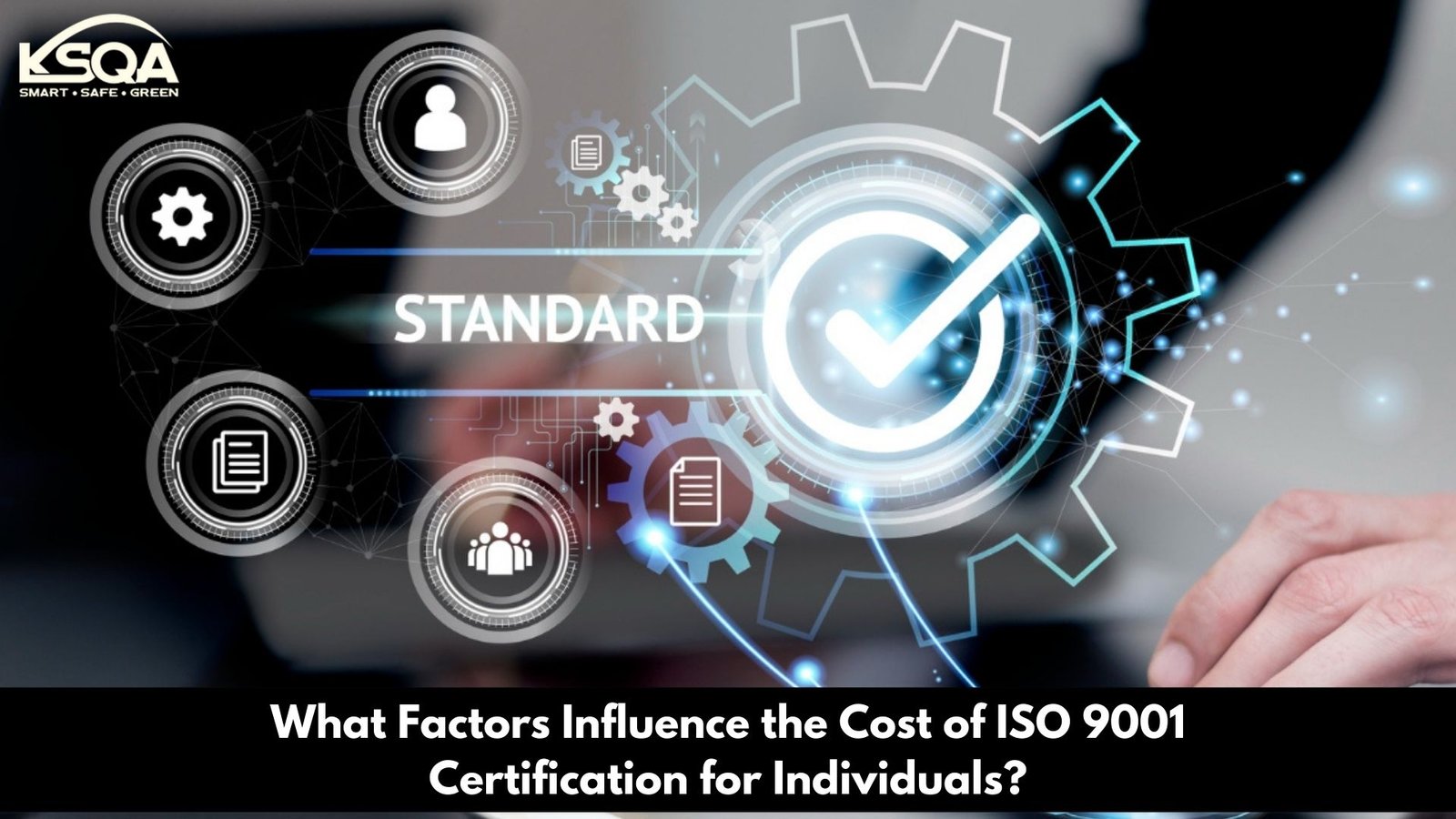ISO certification is a hallmark of quality management systems. It aids businesses in attaining operational proficiency and gaining a competitive edge. By implementing ISO standards, businesses can streamline processes, amplify efficiency, and elevate customer satisfaction. This internationally acclaimed standard sets forth guidelines for quality management systems, ensuring consistency and reliability in products or services.
The ISO 9001 auditor certification process itself is a valuable learning experience, prompting organizations to analyze their operations and pinpoint areas for improvement critically. Ultimately, ISO certification serves as a testament to a business's commitment to continuous betterment, setting it apart from rivals and unlocking new opportunities.
In this blog, we'll talk about how small businesses can get ISO certification and how a certified auditor can help. We will also discuss the cost associated with this certification.
Things To Consider Before Getting An ISO Certification Cost for Small Business Owners
Small businesses often confront unique hurdles when it comes to implementing ISO standards and obtaining certification. Cost is a significant consideration, as the process can be resource-intensive.
Here are some general considerations for ISO certification costs for small business owners:
Evaluate Your Needs and Requirements
The cost of ISO certification can fluctuate depending on the size of your organization, the intricacy of your operations, and the specific standard you wish to implement. Conduct a thorough assessment of your business needs and requirements to determine the most appropriate ISO standard and the level of support required.
Explore Cost-Effective Strategies
Small businesses can explore various cost-effective strategies to minimize the financial burden of ISO certification. These strategies may include:
Using online resources and self-study materials
Seeking guidance from industry associations or government agencies
Partnering with experienced consultants who offer tailored solutions
Implementing ISO standards in phases to distribute costs over time
By exploring these strategies, small business owners can uncover the optimal ISO certification cost that fits their budget while still achieving their desired outcomes.
Utilize Available Resources and Support
Many organizations and government agencies offer resources and support specifically designed for small businesses seeking ISO certification. These resources may include:
Training programs and workshops
Funding opportunities or grants
Mentorship programs with experienced professionals
Online tools and templates
Leveraging these resources can significantly reduce the overall cost of ISO certification and provide valuable guidance throughout the process.
Continuously Evaluate and Optimize
ISO certification is not a one-time investment; it requires ongoing commitment and continuous improvement. Small business owners should regularly evaluate their processes, identify areas for optimization, and implement necessary changes to maintain compliance and reap the benefits of ISO certification.
Prioritize Internal Training and Knowledge Transfer
One effective way to reduce the long-term costs associated with ISO certification is to prioritize internal training and knowledge transfer. By investing in upskilling your workforce and developing in-house expertise, you can minimize reliance on external consultants and auditors, leading to significant cost savings over time.
Collaborate with Industry Peers and Knowledge-Sharing Networks
Small business owners can leverage the power of collaboration to share knowledge, resources, and experiences related to ISO certification. Joining industry associations, participating in knowledge-sharing networks, or forming strategic partnerships with like-minded businesses can provide valuable insights and potentially reduce costs.
Measure and Communicate the Benefits
While the upfront costs of ISO certification may seem daunting, it is essential to measure and communicate the long-term benefits to stakeholders. It can lead to improved operational efficiency, enhanced customer satisfaction, increased competitiveness, and access to new markets, ultimately contributing to revenue growth and profitability.
By adopting a strategic approach, small business owners can uncover the optimal ISO certification cost that aligns with their budget and business objectives, ensuring long-term success and competitiveness in the market.
Reasons to Invest in ISO 9001 Auditor Certification
ISO 9001 is a globally recognized standard for quality management systems. Organizations that implement ISO 9001 demonstrate their commitment to delivering consistent, high-quality products or services that meet customer requirements. To ensure compliance with ISO 9001 standards, organizations must undergo periodic audits conducted by qualified auditors.
Investing in ISO 9001 auditor certification is a strategic decision that yields numerous benefits for individuals and organizations alike. Here are compelling reasons to pursue this certification:
Enhance Organizational Compliance and Quality
Certified ISO 9001 auditors possess specialized knowledge and skills to conduct thorough assessments, identify areas for improvement, and provide guidance on implementing corrective actions. This expertise ensures that organizations maintain compliance with quality management standards, continuously improve their processes, and deliver consistent, high-quality products that meet customer requirements.
Contribute to Business Growth and Competitive Advantage
By helping organizations achieve and maintain ISO 9001 certification, auditors play a crucial role in supporting business growth. Consistent adherence to quality standards can enhance customer satisfaction, reduce operational costs, and gain a competitive edge in the market, leading to increased business opportunities, expanded market reach, and long-term sustainability.
Professional Development and Continuous Learning
The field of quality management is dynamic, and ISO 9001 auditors must stay up-to-date with the latest changes and updates to the standards. Pursuing this certification fosters a commitment to lifelong learning, enabling auditors to continuously enhance their knowledge and skills ensuring their expertise remains relevant and valuable.
Networking and Industry Connections
Auditors have the opportunity to interact with professionals from various sectors, exchange best practices, and gain valuable insights into different organizational cultures and processes. These connections can lead to collaborative projects, mentorship opportunities, or potential career advancements.
Foster a Culture of Quality
Certified auditors serve as champions of quality, promoting a mindset where every employee strives for excellence. This cultural shift can lead to a more engaged workforce, where everyone is aware of their role in maintaining quality standards, ultimately contributing to organizational success.
Risk Management and Mitigation
ISO 9001 auditors are equipped with the skills to identify potential risks to quality management systems, allowing organizations to address issues proactively before they escalate. Effective risk management is essential for maintaining customer trust, ensuring the integrity of operations, and mitigating potential losses.
In addition to external benefits, they can also contribute to internal brand reputation and employee morale. When employees see the organization's commitment to quality and the investment in professional development, it can foster a sense of pride and motivation, leading to a more engaged and productive workforce.
Overall, the investment in ISO 9001 auditor certification is not only a practical decision for ensuring quality management but also a strategic move to elevate an organization's brand reputation, credibility, and competitive advantage within the industry.
Conclusion
Securing ISO certification for a small business is a transformative journey for businesses pursuing operational excellence and a competitive edge. By implementing ISO standards, organizations can streamline processes, amplify efficiency, and consistently deliver high-quality products or services. The certification process itself serves as a valuable learning experience, prompting critical evaluation and continuous improvement.
For small businesses, uncovering the optimal ISO certification cost requires a strategic approach, leveraging available resources, and exploring cost-effective strategies. Investing in ISO 9001 auditor offers numerous benefits, including career advancement, development of valuable auditing skills, and contributions to organizational compliance and business growth.
Looking to boost your small business? Discover the benefits of ISO 9001 and AS9100 certification with KSQA. Enhance your operations, cut down on expenses, and achieve sustainable growth. Don't wait; reach out to us today and take the first step towards a brighter business future!





.jpg)

.jpg)